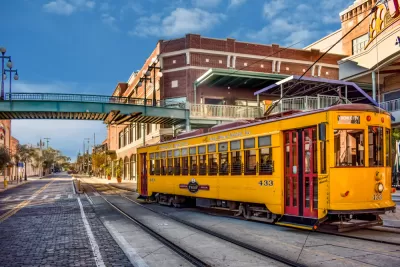Despite the line’s reliability and success, funding for its future expansion and operations remains undetermined.

An article in the Tampa Bay Times by Olivia George profiles Tampa’s TECO Line Streetcar, which opened in 2002 and became fare-free in 2018. Since then, the neighborhoods along the streetcar line have transformed as the city became one of the nation’s hottest housing markets.
“Celebrating its 20th birthday this month, the TECO Line Streetcar has evolved from a charming yet oft-disparaged tourist attraction into one of the county’s few reliable public transit options for those lucky enough to benefit from its 2.7-mile footprint.” Advocates want to see the system extended to benefit more commuters in the highly congested city, but the city has been unable to match a $67.3 million state grant received in 2020, and future funding for the operating agency, the Hillsborough Area Regional Transit Authority, is uncertain.
The streetcar is somewhat of a beacon in an unreliable transit landscape, George writes. While local buses are often late, delayed by regular traffic and mechanical failures, “The streetcar comes every 15 minutes and operates until 2 a.m. on weekends. Next year, the cars will run every 12 minutes on weekends. The county transit agency wants to further boost efficiency by increasing signal priorities and preemption to ensure frequency is maintained.”
FULL STORY: After 20 years, Tampa’s streetcar is a front row seat to downtown’s rebirth.

Maui's Vacation Rental Debate Turns Ugly
Verbal attacks, misinformation campaigns and fistfights plague a high-stakes debate to convert thousands of vacation rentals into long-term housing.

Planetizen Federal Action Tracker
A weekly monitor of how Trump’s orders and actions are impacting planners and planning in America.

In Urban Planning, AI Prompting Could be the New Design Thinking
Creativity has long been key to great urban design. What if we see AI as our new creative partner?

King County Supportive Housing Program Offers Hope for Unhoused Residents
The county is taking a ‘Housing First’ approach that prioritizes getting people into housing, then offering wraparound supportive services.

Researchers Use AI to Get Clearer Picture of US Housing
Analysts are using artificial intelligence to supercharge their research by allowing them to comb through data faster. Though these AI tools can be error prone, they save time and housing researchers are optimistic about the future.

Making Shared Micromobility More Inclusive
Cities and shared mobility system operators can do more to include people with disabilities in planning and operations, per a new report.
Urban Design for Planners 1: Software Tools
This six-course series explores essential urban design concepts using open source software and equips planners with the tools they need to participate fully in the urban design process.
Planning for Universal Design
Learn the tools for implementing Universal Design in planning regulations.
planning NEXT
Appalachian Highlands Housing Partners
Mpact (founded as Rail~Volution)
City of Camden Redevelopment Agency
City of Astoria
City of Portland
City of Laramie




























